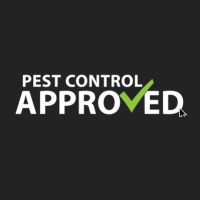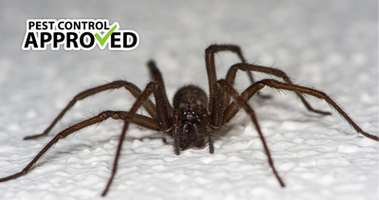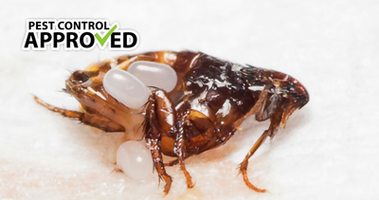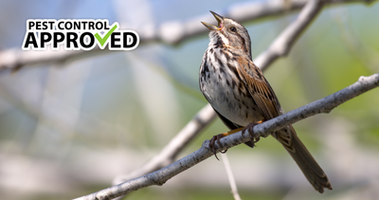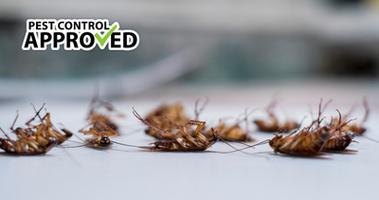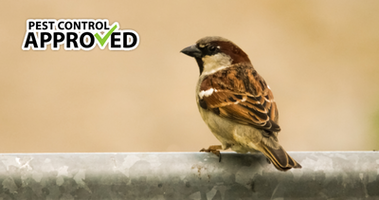
Spider - the word alone is a nightmare for many people. Although the creepy eight-legged insect is not very harmful to humans, it is one of the most dreaded animals. Spiders, in fact, are afraid of humans and tend to stay outdoors. If you find them inside your home, they are looking for food and shelter and definitely not trying to attack you. The only spider species that you should be careful of are the Black Widow and Brown Recluse. They are venomous spiders, but they only bite humans in self-defense. Fortunately, there haven’t been any deaths recorded as a result of their venomous bites.
However, if you do not want to share your space with spiders, you have two options: folk remedies or professional service. Both ways can be effective and have been used for a long time. You can decide between the two based on the population of spiders in your house.
Before looking into extermination, you should prevent spiders from getting inside your home in the first place.
Ways to Keep Spiders Out of Your House
Spiders do not need opened doors to enter your house. They stroll in uninvited from anywhere they want, no matter how small that spot is. Keeping your doors closed isn’t probably going to help and you’ll have to take care of a number of things to keep spiders out of your house. Some of those things are listed below.
Seal Your House
Spiders can enter your house through the tiniest holes quite easily. So, the first thing you need to do is to fill all the visible holes and spaces in your walls, windows, and doors. Caulk is a good option. Wires, electrical components, and pipes that run to the outside of the house can also serve to be an entrance for spiders. Apply caulk around them too.
If your window screens are torn or broken, fix them right away. They are a good passage for spiders’ movement in and out of your house. You should also cover your chimney and air bricks with mesh vents. Moreover, the little space between the door and the floor should also be sealed using a draught excluder.
Move the Bins
Spiders love to eat bees and garbage bins are a great place to find bees. Therefore, keeping your bins near your house attract spiders into your house. They tend to stay nearby to enjoy as many feasts as they can. Keep your bins away from your house and keep them closed.
Remove Vegetation
Spiders commonly hide in vegetation ; it provides them shelter, nearby insects, and a good place to hide. Spiders stay on the plants until they need to travel for more food. If vegetation is near the house, they may venture inside seeking food. Not does vegetation increase the chances of an infestation, but stones, mulch and other decorative pieces serve as great hiding spots for spiders. Keep these items clean and at a distance from your home.
Keep Your Lights Off
Lights attract many insects. These insects are the main food source for spiders. Wherever there is light around your house, there will probably be spiders. To keep the spiders away, turn the outdoor lights off. Also, use opaque blinds on your windows to prevent indoor lights from reaching the outside. You can also switch to sodium vapor lights as they are less attractive to insects.
Clean Your House Properly
Spiders do not appreciate cleanliness; It leaves them little to no space to hide. Dirty rooms, on the other hand, are more likely to have spiders and other insects. Moreover, bugs and other insects are attracted to messy and dirty places that provider food and shelter. Some practical cleaning steps include:
- Clean up any crumbs off the floor, counter, and other surfaces.
- Frequently sweep the floors and wipe the counters to remove dirt or food crumbs.
- Avoid leaving dirty dishes in the sink for long periods of time.
- Keep your place clutter-free. Do not pile up newspapers or dirty clothes.
Ways to Get Rid of Spiders
If, after meticulous cleaning, one spider still manages to enter your house, do not panic. If you continue to follow the preventive measures above, the spider will not stay long. It will soon leave your house for a dirtier place with more food to eat and space to hide. If you do not want to take that chance, follow the remedies mentioned below to remove spiders from your house.
Remedies to Deal with Spiders
Chestnuts or Conkers
Chestnuts are a great way to get rid of spiders. This method is a common folk remedy.. Horse chestnuts, also called the conkers, have certain chemicals that repel spiders. Simply place chestnuts in the areas where you often spot spiders. To make the remedy more effective, make some holes in the chestnuts.
Conkers can be poisonous to pets so do consult a vet before using this method.
Essential Oils
There are some strong fragrances that spiders do not like. Fortunately, they are commonly used in our homes like peppermint, tea-tree, cinnamon, rose, etc. Fill a spray bottle with water and a few drops of essential oil and squirt it around the house. It will drive away the spiders and make your home smell good. To keep this remedy working effectively, regularly change the oil you spray.
Essential oils can also be used without dilution. Dab a small amount of undiluted oil onto a cotton ball and stuff it into the gaps, cracks and other possible hiding spots.
Do not use peppermint oil if you or anyone residing in your house has G6PD deficiency, is allergic to peppermint, or has serious asthma or COPD.
Peppermint oil and other diffused oils can interfere with a number of medicines. If you are on any kind of medication, consult your doctor before using essential oils. Some common medications that interact with peppermint oil include:
- Antibiotics
- Medicines for blood pressure and other heart diseases
- Iron supplements
- Phenytoin, Valproic acid and other medicines for seizures
- Tums, Maalox, and other medicines used to treat stomach acid
- Cyclosporine
The Garlic Mixture
The smell of garlic is noxious to spiders and they will avoid the smell. Take a garlic clove, whole or crushed, and put it in a spray bottle filled with water. Spray the garlic water around the house, especially at the corners, skirting boards, and all nooks and crannies.
Vinegar
If you do not want to use essential oils or you find them ineffective, you can switch to vinegar. Take a spray bottle and fill it half full of white vinegar. Dilute the vinegar by adding an equal amount of water into the spray bottle. Spray the liquid mixture in the corners, on the skirting boards, and similar surfaces. Do not spray the vinegar on the polished surfaces as it can damaged them.
You can also spray the mixture on the spiders to kill them right away. The acidic nature of vinegar burns and kills the spider in a few minutes.
Another way to use vinegar is to place it on small plates and keep those plates in the dark corners of the house. The smell alone will make them leave.
Grow Eucalyptus
Eucalyptus plants are beautiful and have a pleasant scent. But, while the smell of eucalyptus might be pleasant for humans, it isn’t for spiders. Actually, spiders abhor eucalyptus. Eucalyptus can be grown eucalyptus as a houseplant as well as an outdoor plant. Keeping one near your window, especially outside, can deter spiders from going entering your home.
You can also purchase eucalyptus branches from a nearby store and keep them under your furniture. You will be surprised at how effective it is in repelling pests, including spiders.
If you do not want to keep eucalyptus, you can try planting mint or lavender. They too have strong smells that drives spiders away.
The Citrus Therapy
One of the best ways to get rid of spiders is through the use of citrus peels. Spiders, like many insects, detest citrus scents. Take a citrus peel, preferably lemon, and rub it all over the places where spiders hide like windowsills, door frames, skirting boards, bookshelves, and in the closet. You can also apply the lemon peel in your basement and garage.
Furthermore, you can use lemon-scented furniture polish to prevent spiders from hiding in or under your furniture. Citronella candles are also useful for getting rid of the spiders, but it is better to burn them outside because they can cause headaches and breathing problems when burned in a closed room.
Another interesting spider deterrent is lemons and tobacco. Soak tobacco in lemon juice and sprinkle it on high-traffic spider areas.
Cedar
The scent of the cedar plant is also extremely helpful in driving the spiders away. You can keep cedar wood at different places in your house like in your wardrobe, drawers, etc. to keep spiders away from those areas. You can sprinkle cedar chips around your home to drive spiders and other insects away from your house. Its woody scent will also make your house smell great!
Bleach
Bleach is an effective homemade pesticide. Dilute bleach and spray it onto the common spider-hiding spots.
Diatomaceous Earth Powder
Spread a fine layer of diatomaceous earth powder in every corner where spiders can possibly be, i.e., windowsills, door frames, cracks, etc. This white powder is made from the remains of water algae, diatom. It is not harmful to humans or pets, but it is deadly to spiders. When a spider crawls over this powder, its body is cut, killing the spider in minutes. You can also spread this powder outside your house.
Proven Pest Control Methods to Deal with Spiders
There are some proven do-it-yourself pest control methods other than folk remedies. The methods below are also simple and affordable.
Vacuum the Webs
Whenever you come across a spider web, vacuum it right away. It should be noted that leaving one spider web in an area, can prevent other spiders from inhabiting your home.
Glue Traps
Spiders usually hide in dark areas. Place a trap at each dark spot in your house. Make sure to keep it flat so it doesn’t curl up. The spiders die as soon as they walk onto it. Discard the trap after it has caught a few spiders. This method does not help remove spider webs or eggs. Glue traps are best used along with other methods.
Powerful Insecticides
There are some chemical sprays or pesticides available to deal with insects. Some of those sprays are specifically for spiders. You can spray them around the house wherever you feel necessary, covering all the corners and cracks.
Before using the spray, carefully read the instructions. Their misuse can lead to poisoning of people and pets. Foggers are usually ineffective to treat spider issues. Spiders often avoid contact with the chemicals from foggers.
Pest Control Service: Spider Exterminator
Exterminators are professionals licensed to deal with spider and other insect infestations using their skills, knowledge, and higher-grade chemicals. These people know spiders’ behavior and have the required expertise to deal with such issues safely and efficiently. They are the last resort for any homeowner dealing with insect infestations.
Sometimes the pesticide the exterminator uses are strong and require the residents to vacate the house for a few days.
When to Call an Exterminator?
You do not need an exterminator if you only notice one or two spiders. But it is important to deal with those spiders because they will reproduce rapidly if not eliminated. If you spot a large amount of spiders, call an exterminator right away.
Types of Services and Their Cost
There are two types of pest control treatments for spiders: the basic reactive treatment, and the preventive treatment. They vary in purpose and cost. To help you make an informed decision, we have detailed the types of treatments and their costs.
Basic Reactive Treatment
For spider infestations, you need a basic reactive treatment. In this treatment, the exterminator sprays strong pesticides around your house, particularly ceilings, cracks, crawl spaces, and skirting boards. Its main purpose is to control the current infestation.
This type of treatment costs around $200 to $350, based on the size of your property.
Preventive Treatment
If you do not have spiders, but worry about a future infestation, you can get a preventative treatment. It is designed to prevent spiders from invading your house in the near future.
In this treatment, the exterminator applies a pesticide on the exterior of your house, including eaves, doors, windows, and other potential entrances.
This type of treatment is a contract-based service. The contract is either monthly, quarterly or annual, according to which the exterminators make scheduled visits. The frequency of the visits depends upon the contract and so does the payment. Generally, this treatment costs between $30 to $60 per month.
Important Details About the Infestation
There are some things that you must be clear about before approaching an exterminator for his services. The exterminator will require these details to provide you an effective service. These details include:
The Type of Spiders Lurking in Your House
There are more than 35,000 different species of spiders. It is particularly important to know the kind of spider you have in your house to have an effective treatment against them.
Locations around Your House
There might be some specific areas where you would have spotted the most spiders Generally, such areas include the attic, basement, garage, ceilings, and eaves. Identifying these places is important so that the exterminator can effectively focus on those areas.
When Did It All Start?
This question is the most important question. It tells the exterminator about the level of infestation that they will be dealing with.
How Often Do You See Cobwebs?
Cobwebs are homes to spiders as well as traps for their prey. They are among the most visible signs of spiders. They can be very annoying as they give a dirty and worn-out look to the area and you have to remove them frequently. If you are removing spider webs daily, that indicates a large colony of spiders present in your house.
Have you Spotted Spider Eggs?
Spiders become a serious problem once they start to lay eggs. Each egg sac can have from 2 to 1000 individual eggs inside, depending upon the type of spider. Just think about the size of the spider colony an egg sac can create once it hatches!
The mother spider wraps the eggs in silk and hangs them in places she considers safe like the corners of the ceiling, under the leaves of indoor plants, etc. Some spiders even carry them around until they hatch.
If you find one or more egg sacs in your home, it indicates that an infestation is on its way or might have already started.
Questions to Ask the Exterminator
To further ensure a successful spider extermination, you also need to ask the exterminator some questions.
Ask for Credentials
Ask any potential exterminator for their credentials first. The credentials include the company’s license, registration documents, and certifications. They are written proof of the company’s authorization to provide the service.
Genuine service providers should have no issue providing these documents. However, if any service provider fails to provide these documents, you should better avoid them.
Ask for References
To check the competency of the company, it is important to find customer reviews. Do not be fooled by random online reviews. They are often misleading as only extremely satisfied or unsatisfied people typically leave reviews. Some reviews may even be fake. Disregard reviews that are overly generic, use stock or celebrity profile pictures. If possible, try to get contact information for customers from the company. Former or current customers can give you trustworthy reviews.
There are some reliable websites that provide true reviews about goods and services. The two most famous websites are HomeAdvisor and Angie’s List. You can consult the professional reviewers on these websites.
Know the Length of Their Tenure
It is important to know how long the company has been in the pest control industry. It reflects the efficiency of the company’s services and their customers’ satisfaction. If a company has been operating for a long time, it generally means that there haven’t been any major issues or complaints about its services.
The most reliable way to find legitimate complaints filed against a company is by contacting organizations like the States Department of Agriculture, Better Business Bureau, or EPA. These organizations are always ready to help you with your queries.
Chemicals and Their After-Effects
Before getting started with any kind of treatment, check the chemicals to be used and their effects on humans and animals. The most common chemical that pest control services use against spiders is a pesticide with pyrethrin. To verify the chemical, which is going to be used on your property, you can ask the exterminator for a list of chemicals they will be using along with instructions about its usage and side effects.
Offered Guarantee
Most exterminators provide a guarantee for customer satisfaction. These guarantees vary from company to company. Some companies offer a pay-back while others promise a reapplication of the chemical if you spot spiders within a specified time period. Usually, these guarantees are for one to five years. This helps to ensure that you have chosen a reliable service provider. Along with the guarantee, also ask about yearly inspection charges.
Number of Treatments
Once the exterminator has inspected your house to check for the severity of the infestation, make sure to ask about the number of treatments required. If the spiders’ population has increased considerably, the exterminators would suggest having more than one treatment because eradicating all the spiders at once might not be possible. A good exterminator will be upfront about the situation.
Before and After the Spider Treatment
There are some things you need to do before and after the extermination treatment. Make sure you cooperate with your exterminator and follow all their instructions. A few common things to do before the treatment are:
- Remove your personal belongings from the floor, unlocked drawers, etc. and keep them at a safe place
- Make sure there is no clutter of paper or clothes in the area
- Empty the kitchen cabinets if they need a thorough treatment
- If you have kids, keep their toys and clothing at a safe place where the chemicals won’t be applied. It can be dangerous for kids to come in contact with the chemicals or, worst, ingest them.
- Secure your pets in rooms that are not going to be treated or keep them at the kennel.
- Aquariums should also be secured by removing them from the area to be treated or by covering them with heavy plastic. This also requires turning off the air pump.
- Empty your garbage bins.
- Clean the area around appliances that are not usually moved such as microwaves, refrigerators, etc.
Once the treatment is over, do the following:
- Do not let your pets or children go into the treated rooms until the chemical has dried.
- Immediately report to the exterminator if you see any living spiders.
- Note the locations of any remaining spiders after the treatment. It is likely that the spiders migrate to untreated areas.
Frequently Asked Questions
How do I know if the spider in my house is dangerous?
Spiders are not dangerous except the Brown Recluse and Black Widow. These two are rarely seen in Alberta. But these venomous spiders have painful bites. It is important to get proper treatment if you think you have been bitten by one of these spiders. If you need help with the identification, here is a short description of them.
Black Widow
The Black Widow is found all over the world but is most commonly seen in North America. A female Black Widow has a shiny black body with either red or yellow hourglass design on the underside of its abdomen. The length of the body is about 1 inch.
Male Black Widow are rarely seen because they are killed and eaten by females after mating. The males are smaller than the females, not even half their size. They have a similar appearance to the females, but they do not have the distinctive hourglass. Instead, they have red and white stripes on the side of their abdomen.
Brown Recluse
The Brown Recluse is mainly found in North America. Their size is usually between 0.24 to 0.79 inches. They are usually brown ranging from whitish brown to blackish gray. The colour of a spider may vary along its length. They can have different markings on their backs that sometimes look like violins.
What do spiders eat?
Spiders eat insects like bees, moths, mosquitoes, and cockroaches. A spider’s sticky web traps the insects as soon as they step on it.
Do spiders like moist areas?
Yes, spiders like moist areas like a sink, a shower room, or areas with water leakages because the humidity keeps their skin moist.
How do I know if I’ve used enough peppermint or other essential oil?
You need to keep spraying until you can smell it. If you can’t smell it, the spiders will not be able to smell it. Spray more of the mixture when you cannot easily smell the oil.
Why should I leave my house during spider treatment?
The chemicals used need time to dry in order to be effective and safe. These chemicals can be dangerous for humans and pets if inhaled or ingested. Some spider exterminators that do not require you to leave the house. They use different chemicals that do not cause any harm if inhaled. Make sure to ask your exterminator about this before the service.
How long do I have to stay away from the house?
This depends upon the strength of the chemical used. Usually, your exterminator will tell you at the time of booking. It can be from four to six hours or even a full day.
How long do the spider control services take?
This mainly depends on the size of the property. Generally, spider extermination take around one to two hours.
How can I get rid of spiders in my car?
Cars are great hiding spots for spiders, and it is quite difficult to keep them away. They can enter your car through open doors and windows. The first tip is to keep the doors and windows closed as much as possible. Find and seal any cracks or gaps that might serve as entry points. Vacuuming the car regularly to clean off any crumbs, spider eggs, and cobwebs can also help.
You can use the home remedies listed above for your car. Those remedies help keep spiders away.
Should I postpone my spider treatment service if it is raining?
People often request spider exterminators to postpone the treatment because of rain. They believe that the chemicals used in the treatment will wash away with rainwater or that their strength might be reduced. However, that is not true.
If you are getting treatment for your lawn, then rain and snow can add to the efficiency of the treatment. Some treatments make use of granular chemicals in the form of pellets. These chemicals require water to be activated and to penetrate deep into the soil. The rainwater fulfills these requirements by making the soil moist. This creates barriers in the soil, which keeps the spiders out.
For indoor treatments, the weather is rarely a factor unless your windows or doors leak.
Conclusion
Despite being a beneficial insect, spiders are hated by many homeowners. They find spiders creepy and dangerous. The two most harmful species are the Black Widow and Brown Recluse. Infestations of venomous spiders should be treated quickly by a professional. Other spider infestations may be treated using home remedies. However, for a quicker removal, contact a pest control service. Remember to ask for referrals and look at reviews, both online and offline. Make sure to gather all the necessary details about the exterminator in order to get the most efficient and guaranteed service.

